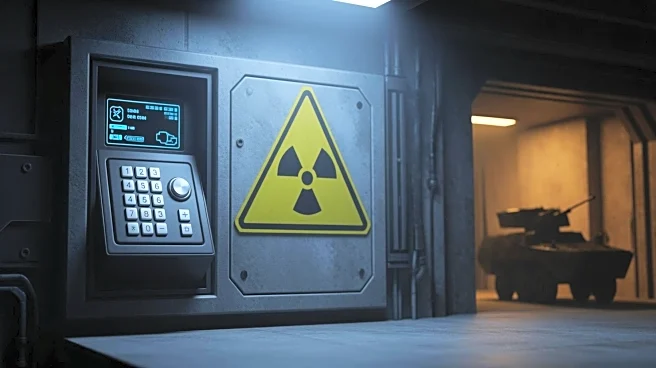What's Happening?
NATO has allowed journalists to witness its annual nuclear exercise, Steadfast Noon, for the first time, marking a shift towards transparency. This exercise, held at Volkel Air Base in the Netherlands,
involved NATO fighter jets practicing the hypothetical deployment of U.S. nuclear weapons. The event, previously top secret, aims to deter Russia amid ongoing tensions related to the Ukraine war. The exercise included 2,000 personnel and 70 aircraft from 14 NATO members. U.S. Air Force Colonel Daniel Bunch emphasized the importance of transparency in demonstrating NATO's capabilities to the public. The move comes as Russia conducted its own nuclear readiness tests, with Kremlin officials warning of potential nuclear conflict.
Why It's Important?
The decision to publicize NATO's nuclear exercises reflects a strategic shift in response to Russia's aggressive actions in Ukraine. By increasing transparency, NATO aims to reassure its member states and deter potential nuclear threats from Russia. This development highlights the growing importance of nuclear deterrence in global security dynamics. The exercise serves as a reminder of the ongoing geopolitical tensions and the need for robust defense strategies. It also underscores the alliance's commitment to maintaining peace and stability in Europe, while addressing public concerns about nuclear capabilities.
What's Next?
NATO's increased transparency may lead to further diplomatic engagements with Russia, as both sides navigate the complexities of nuclear deterrence. The alliance's decision to involve journalists could prompt other military organizations to adopt similar transparency measures. Additionally, NATO's public demonstration of its nuclear capabilities may influence future defense policies and strategies, potentially leading to increased investments in military technology and infrastructure. The ongoing dialogue between NATO and Russia will be crucial in preventing escalation and ensuring regional stability.
Beyond the Headlines
The public exposure of NATO's nuclear exercises raises ethical questions about the balance between transparency and security. While transparency can build public trust, it also risks revealing strategic details to adversaries. This development may influence public perception of nuclear weapons and their role in international relations. The exercise highlights the cultural shift towards openness in military operations, reflecting broader societal demands for accountability and transparency in government actions.








